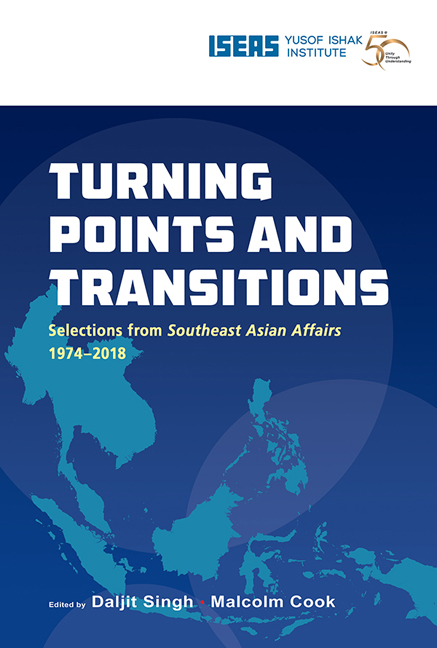Book contents
- Frontmatter
- Contents
- Message from the Director
- Foreword
- Foreword
- Introduction
- THE REGION
- BRUNEI
- CAMBODIA
- Cambodia and Regional Diplomacy (1982)
- Kampuchea 1979–81: National Rehabilitation in the Eye of an International Storm (1982)
- Cambodia 1991: Lasting Peace or Decent Interval? (1992)
- Hun Sen's Pre-emptive Coup: Causes and Consequences (1998)
- Cambodia in 2017: Plus ça change… (2018)
- INDONESIA
- LAOS
- MALAYSIA
- MYANMAR
- THE PHILIPPINES
- SINGAPORE
- THAILAND
- VIETNAM
Kampuchea 1979–81: National Rehabilitation in the Eye of an International Storm (1982)
from CAMBODIA
Published online by Cambridge University Press: 29 May 2019
- Frontmatter
- Contents
- Message from the Director
- Foreword
- Foreword
- Introduction
- THE REGION
- BRUNEI
- CAMBODIA
- Cambodia and Regional Diplomacy (1982)
- Kampuchea 1979–81: National Rehabilitation in the Eye of an International Storm (1982)
- Cambodia 1991: Lasting Peace or Decent Interval? (1992)
- Hun Sen's Pre-emptive Coup: Causes and Consequences (1998)
- Cambodia in 2017: Plus ça change… (2018)
- INDONESIA
- LAOS
- MALAYSIA
- MYANMAR
- THE PHILIPPINES
- SINGAPORE
- THAILAND
- VIETNAM
Summary
On 25 March 1979, Jean-Pierre Gallois of the Agence France Presse (AFP), the first Western journalist admitted to Kampuchea after the overthrow of the Pol Pot regime, filed this report from Phnom Penh:
The Cambodia that survived Pol Pot is like a dismembered body that is trying to come back to life. Its economy is shattered, its communications severed. Millions of hectares of rice paddies have been temporarily abandoned. A population of refugees is returning home along pitted roads and highways or assembling in the suburbs of empty and dilapidated cities.
Phnom Penh, which two non-communist journalists have been allowed to visit for the first time since January 7, is in the image of the rest of the country. There is no drinking water, no telephone, no mail service, no transport, no registry office, no money, no markets, hardly any electricity, hardly any schools, hardly any medical dispensaries. The city is so quiet that bird-song has a sinister ring to it. Its residents survive like nomads by eating roots, wild fruit, leaves and fish, and sometimes rice and flour distributed by the authorities.
The new government has no effective political control of the country and cannot guarantee the security of its citizens throughout the territory. Phnom Penh unofficially admits that all the southwest of the country lies beyond its administration, and that the situation is only secure in the capital itself and in the provinces east of the Mekong. The region bordering Thailand lies completely outside its control.
In Phnom Penh itself, there are three Vietnamese advisers for every Cambodian official, ten Vietnamese soldiers for every Cambodian one.
City dwellers returning home, particularly workers, are still grouped outside the towns waiting… Neither the new Cambodian government nor their Vietnamese allies seem at present willing to give these returning refugees a responsibility in the running of the country's affairs…
Cambodia cut in two, with a non-existent economy and a phantom government still presents a picture of darkness. Only faith and hope can save the Cambodian people from extinction.
About one and a half million people, of a population of seven million or more, had perished in the Pol Pot period from 1975 to early 1979, including up to 500,000 deaths by execution and the rest from starvation, disease, and overwork.
- Type
- Chapter
- Information
- Turning Points and TransitionsSelections from Southeast Asian Affairs 1974-2018, pp. 215 - 226Publisher: ISEAS–Yusof Ishak InstitutePrint publication year: 2018

